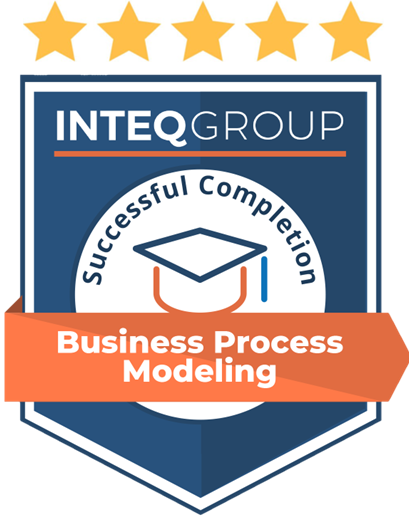Through hands-on methods (e.g., gap analysis, pain point analysis, root cause analysis) and real-world scenarios, participants learn to create clear, actionable process models and identify high impact opportunities to drive business process efficiency and support strategic goals at every level of the organization.
Join over 300,000 business and IT professionals trained by Inteq worldwide.
What You Will Learn
- Map current-state (As-Is) and design future-state (To-Be) processes
- Surface critical inefficiencies, redundancies, and process breakdowns that hinder operational effectiveness.
- Identify hidden bottlenecks and pain points that contribute to delays, rework, and increased cost.
- Reveal functional silos and disconnects that create fragmentation and limit cross-departmental collaboration.
- Apply the BPMN business process modeling standards
- Link processes to organizational goals and performance metrics
- Use process analysis to support business transformation initiatives
Who Should Attend
- Business Analysts, Systems Analysts, Process Analysts
- Operations and Project Managers
- IT and Systems Professionals
- Change Management Leaders
- Business Architects and Subject Matter Experts (SMEs)
- Anyone involved in business process improvement
Course Benefits
- Enhance your ability to streamline and improve business operations
- Build stakeholder confidence with clear, effective process models
- Strengthen cross-functional collaboration and communication
- Position yourself as a leader in organizational efficiency and innovation
- Increase your value in roles focused on process excellence
Course Format & Delivery Options
- Delivery: Live online, self-paced on-demand, or onsite
- Duration: 2 days | 16 Hours
- Certification: Certificate of Completion + CEUs
- Tools Provided: Templates, models, and frameworks for reuse
What Sets This Course Apart
- This course is led by industry expert James Proctor and includes real-world case studies to reinforce concepts in practical, relatable ways.
- Inteq’s proven methodology and decades of experience make this course a trusted choice for professionals seeking real results in process improvement and analysis.
- Transformation: This is not just a training course but a transformational experience that prepares you and your team to become trusted advisors in your organization. Participants leave with actionable skills and a toolkit they can use immediately.
Register Now
Ready to transform and improve business processes? Add to cart (see side panel) and start learning as soon as today. Or, for Team Training, please contact us via the Team Training side panel to discuss your specific training goals and objectives - including 3, 4 and 5-day hybrid and bootcamp training programs.
Course Outline
Framework And Key Concepts
Customer and Business Value
Business Functions and Processes
Why the Current State Matters
The Three Layers of Analysis
Business Process Mapping (BPMN)
Relationships and dependency
Conditional branching
Events and external activities
Workflow patterns
Deconstructing Work Activities
The 7 W’s
Deconstructing work activities
Activity granularity
Measures, Metrics And Indicators
Measures and metrics
Performance metrics and KPIs
Selecting measures, metrics and KPIs
Analyzing Business Processes
Pain point gap analysis
KPI gap analysis
Strategic gap analysis
Root cause analysis
BPL At Scale Case Study
Participants map, measure and analyze a complex real-world business process case. This case study provides an invaluable template that participants can leverage to jump start and improve business process analysis in their organization.
Leveraging AI Prompt Engineering*
Overview of Generative AI (GenAI)
The secret sauce: Asking the right questions via prompt engineering
Applying AI prompt engineering to analyzing business processes.
10 myths of analysis
Practical Guidance And Next Steps
Segue to Business Process Reengineering
Harmonizing Business Process Variation
Leveraging Frameworks and Models
Customer Engagement Considerations
* Before using AI as part of your business analysis toolkit, it's essential to first deeply understand business process modeling and analysis first principles concepts and best practice skills, techniques and methods provided in this course. You can then leverage this knowledge via GenAI prompt engineering to amplify and enhance the speed and quality of analysis.
- 10 Business Process Modeling Best Practices
This post outlines essential best practices for modeling business processes, emphasizing the importance of understanding and accurately depicting current-state processes before attempting improvements. It discusses components of a business process, such as work activities and workflows, and provides guidance on creating effective process maps. - 10 Misconceptions of Censuring Current State Mapping & Analysis
This post addresses common misconceptions about the value of mapping and analyzing current-state business processes. It argues that understanding existing processes is crucial for successful transformation initiatives and cautions against skipping this step, which can lead to suboptimal outcomes and reduced stakeholder engagement. - A Fatal Rookie Mistake: Understanding a Process vs Improving a Process
This article emphasizes the importance of not conflating the understanding of a process with its improvement. It highlights that a thorough grasp of the current state is essential before proposing enhancements, aligning with the course's focus on accurate process analysis. - 10 Strategic Inflection Points that Require Transformational BPR
This blog post discusses scenarios that necessitate transformational business process reengineering, such as rapid growth or regulatory changes. Understanding these inflection points complements the course's teachings on identifying and analyzing critical process improvements. - 5 Must Read Inteq Blog Posts
This compilation includes several articles relevant to business process modeling and analysis, providing additional insights and best practices that reinforce the course material.
OK, there is not a box per se, the content is digital. In addition to 2-days/16 hours of expert instruction you receive:
- Digital Badge of Completion
- Personalized Certificate of Completion
- ACCET Continuing Education Units (CEUs)
- IIBA Professional Development Units (PDUs)
- Electronic (PDF) Comprehensive Page Course Manual
- Case Study Materials
- Supplemental Course Materials
- Anytime eLearning™: Self-Paced Training For Busy Professionals
Inteq’s Anytime eLearning™ provides the perfect option for individuals and small groups to acquire professional level analysis skills as-needed and just-in-time. The course is designed for two days, but Anytime eLearning™ allows self-paced learning. Course access is 90 days, with most participants finishing in 1-3 weeks. Start training as soon as today!
- Live Virtual Classroom: Instructor Led | Live Online. Inteq's innovative Live Virtual Classroom approach brings the benefits of traditional classroom training into a live virtual environment.
- Live Team Training (Virtual or Onsite): Inteq’s Business Systems Analysis 2-day training course can be tailored to your organization’s training objectives and can be combined with other Inteq courses to create a 3, 4 and 5-day hybrid training program.
- Enterprise training for the entire organization.
However, Business Process Modeling integrates seamlessly with the following courses:
Bring Your Team Together For a Live High-Impact Shared Training Experience

2, 3, 4 and 5-Day
Customized Training Options
eLearning + Live Coaching
Anytime, Anywhere, Any Device
Self Paced | 16 Hours | 90-Day Access
Continuing Education Credits:
16 IIBA PDUs | 1.6 ACCET CEUs
Tuition: $695
Save 10% off the total tuition if 3 or more 16-hour eLearning courses are purchased together. The tuition savings is displayed in the cart and at checkout.
Questions or need additional info? Contact us at 800.719.4627 or reach out here We look forward to assisting you!

 Login
Login



































